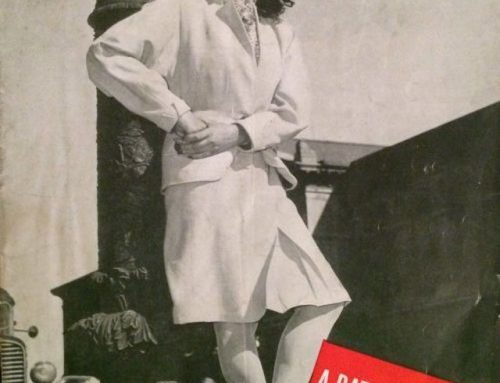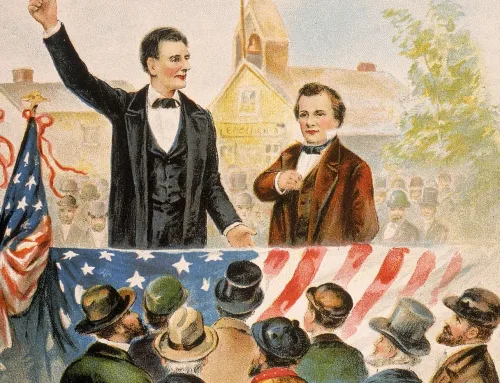By Francisco Velazquez and Michelle Kanaar, Borderless Magazine
Borderless Magazine is an independent, nonprofit newsroom that humanizes stories of immigration. Sign up for the Borderless Magazine newsletter for weekly updates.
When Laura Garcia Garduño heads to work to pick peaches early in the morning, there’s just one thing on her mind: staying safe from COVID-19. She works closely with others in the fields of southern Illinois and fears that the virus could spread quickly if one farmworker gets sick.
Agriculture is a $19 billion industry in Illinois, and the state produces everything from soybeans and corn to strawberries and apples. Much of this industry is built on the labor of immigrants — nearly seventy percent of hired farmworkers in the United States were born in Mexico.
Garduño came to the United States with a friend nineteen years ago and ended up in Murphysboro, a town of just under eight thousand people near the border with Missouri. It’s currently a COVID-19 hotspot. As of Aug. 20 COVID-19 rates are rising in southern Illinois with seven-day rolling average positivity rates now at 7.7 percent, compared to Chicago’s 5.3 percent.
More than half of all farmworkers in the U.S. don’t have health insurance and language barriers can make it difficult for them to understand their rights.
Garduño supports her family by working in the fields as a seasonal farmworker picking strawberries, peaches and apples. It’s hard work and sometimes a family affair. In previous years her 15-year-old daughter has worked alongside her harvesting produce.
Life for immigrant farmworkers can be difficult, says Miguel Sarmiento, the director of Migrant Education Services at the Illinois Migrant Council. His office is in nearby Cobden and offers bilingual homework help and computer access to migrant families like Garduño’s.
“Work in the fields is very demanding. But somebody needs to do this kind of job,” said Sarmiento. “This is something people don’t see: how the food got to your table.”
Garduño and her daughter told Borderless Magazine what life as a farmworker is like and how the COVID-19 pandemic has upended their world:

A painting made by Laura Castro, fifteen, to show what she thought about farm work. The painting was submitted to a contest at the Migrant Education Program. Castro began working picking strawberries when she was five years old. Photo courtesy Laura Castro.
Laura Garcia Garduño
We’ve been transitioning from picking apples but are about to finish because the season for picking peaches just started. When we pick peaches we follow the standard we use for apples and remove the bad ones.
We pick and separate them by their measurement, quality and size. We call the smaller ones, “second quality.” Before our lunch break, we pick up the peaches that have fallen on the floor and toss them into buckets. After our lunch break, we package them in boxes. For this part, you only have one other person helping you.
By 4:30 p.m. we sweep and prepare to do it all again when they need us again.
We all use the same bathroom at work. There’s only one for all thirty-five of us including the three men that work there. No one has been infected so far, but I worry that we’ll be infected with COVID. It’s hard to stay safe.
I work picking peaches on Monday, Wednesday and the weekends. On my days off I work at a factory. I have worked there on and off for five years.
Before COVID I would work at the factory forty hours per week in the off season and make $8.50 per hour. But because of the coronavirus pandemic they reduced our hours. We have to be socially distanced which means they call some of us in and not others.
They give us masks and hand sanitizer at the factory. We don’t eat in the lunchroom anymore. We eat outside. For a while, we had someone at the front desk who took our temperature twice a day and let us in and out of the building. We’ve also had someone who wipes things down every 10 minutes but now that person is also gone. They started doing this only when the first person had COVID in May but have stopped since.
I was actually at risk of getting infected because I gave my coworker who got infected with COVID a ride. He tested positive for COVID-19 the same week I gave him a ride. I left work for three days to take the test for COVID but I was negative. I found out afterwards that the factory was supposed to pay me for my time off but they didn’t. They still haven’t.
When I was hired they gave us a packet of papers that told us our rights. But I guess it was my ignorance that I didn’t know what I was signing. It was all in English and there was no one there to translate the packet. They just handed it to me and said “sign.” I did. I still feel that it is the company’s responsibility to pay us when we have to miss work to take a COVID test.
My biggest worry right now is that someone in my family gets sick with COVID. It would mean we would have to completely isolate ourselves.
Right now we only have a little work but we have it nonetheless. And when it comes to food we’re OK. We’ve been getting a little more time to pay our bills too. But if we had to stay home from work because of COVID we would have nothing.
Being with my kids and my family is what brings me joy right now. I think when you work and they go to school you don’t know them as well. Now in the afternoons we usually go out to walk our three dogs Taffy, Snicker and Rambo. Sometimes we stop and get chocolate ice cream.
Laura Castro
I worked on a farm picking strawberries from when I was about five to when I was eight years old. It was hot and my mom and I would stay there all day. I loved when it rained because it’d be muddy and I like to play in the mud. Even though we were supposed to be working most of the kids played in the mud.
We would have to wake up super early. It would still be dark outside when we left for work. We’d make our sandwiches for lunch the day before. Sometimes it’d be eggs with tortillas and the tortillas would be hard when we ate them the next day.
We didn’t really get drinks and they didn’t have a place for you to drink. If you wanted to get a drink you’d have to stop working and go get one.
When I was nine years old I worked planting strawberries in Cobden, Illinois. The first time I went was with my mom. Eventually I started going with my aunt or cousins because she got other jobs. It was an on and off type of thing. For a kid I thought the pay was fine. I was happy. But they didn’t like kids working there because they’d slack off. They ended up extending their hours to include hours when kids were in school to stop them from coming.
I made a painting that was supposed to show what I thought about farm work and my parents submitted it to a contest at the Migrant Education Program. What I wanted people to see in the painting was that it was always hot. That’s why there’s a sunny half. The other half is raining because we worked in the rain.
I remember being soaking wet. My clothes were muddy and I felt frustrated. It made me cry some days because it was just so hot. If you look really closely in the painting you’ll see a dude wiping his sweat off. You can also see people picking strawberries, like I did.
I put tiny flags everywhere too. I wanted people to know that while most of the workers are Mexicans there are not just Mexicans working. It’s more nationalities. It’s not only us who came here to work. People from other places are also working hard. But it’s Mexicans who get the backlash for taking other people’s jobs. But it isn’t just us in these jobs. And if there seems like there’s a lot of us it’s because other people don’t want to do that kind of work.
And I’m not fully Mexican. My dad is Honduran but he left us before I was even born. For most of my childhood I was left with a nanny because my mom had to work. She’d pick us up really late at night. We’d sleep and then we’d go back to the nanny in the morning. I didn’t really know my mom that well when I was younger. Nowadays she has my stepdad and they work together and help us out.
Because of COVID I get to see more of her, which is nice. I really liked school so I’m kind of sad it’s closed down. Not many people like it but I do. I just finished the ninth grade. I had one online class, a mandatory video game designing class. It was hard but I made my own version of Pac Man.
They also did this thing where you go to school and get packages with everything ready for us. The second time they made us pick up everything and I didn’t know what to get. I ended up not getting a whole month of work for science. I didn’t want to do my homework because the teachers were not checking the paper packets or anything online.
Since everything’s been closed I read at the school’s library because it’s right there. I like science fiction. My teacher gave me the Mara Dyer series before she switched schools.
Like any other kid, I wake up super late and go to bed super late. If I do have any free time I like to paint and make bracelets.
I have only seen one of my friends since school shut down. Her name is Valeria. I met her while we were picking strawberries.
Right now I think I’m taking everything a day at a time. I’ve been having a lot of fun cooking at home and I like to make breaded fish because it’s easy and simple. I just got my first job cleaning apartments too. You could say I’m looking forward to getting paid. I don’t think I’ll be going back to working in the strawberry fields anytime soon. ■
Francisco Velazquez is attending the Craig Newmark Graduate School of Journalism, specializing in international reporting and Spanish-language journalism. He interned at the Wisconsin Center for Investigative Journalism and served as writing fellow for the Center for Journalism Ethics. Most recently, he was awarded ProPublica’s 2020 Diversity Scholarship.
Michelle Kanaar is a documentary photojournalist who focuses on immigration, labor, and education. She is thoroughly committed to social justice issues and is the proud daughter of immigrants from Colombia and the Netherlands.
Cover image by Michelle Kanaar for Borderless Magazine.
Belt Magazine is a 501(c)(3) nonprofit organization. To support more independent writing and journalism made by and for the Rust Belt and greater Midwest, make a donation to Belt Magazine, or become a member starting at just $5 a month.






